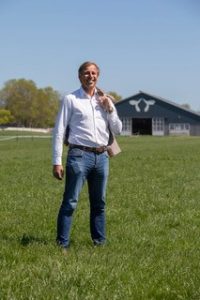Managing Director Henk Bles sets forth his views about the future of dairy farming worldwide. In this article his vision on sustainability.
I would like to refer back to one of my quotes in a newsletter last year.
“Less input per kg means lower GHG emissions and leaving more land for nature, recreation and urbanisation” (https://www.bles-dairies.nl/the-future-dairy-farming)
The world is changing rapidly and faces huge challenges in GHG emission. Most countries signed the Paris Climate Agreement. This agreement aims for keeping the increase in global average temperature to below 2°C above pre-industrial levels; compared to today standards this means that much greater emission reduction efforts will be required in order to hold the increase in the global average temperature to below 2°C.
What is sustainable dairy farming?
After transport, the energy sector and households, livestock farming acts as a major producer of GHG. The most important question here is how and to what extend the dairy farming sector is able to contribute in the aim for reduction. The solution is not as simple as we think. To improve sustainable dairy farming we need to reduce the carbon footprint by at first increasing productivity and efficiency per cow and per hectare. This means less production of GHG per liter of milk combined with an increase of GHG absorption to our soil. The ultimate goal is to have zero balance or as we say: “dairy farmers should aim for climate neutral milk production”. (Note: grassland absorbs more GHG than forest)
The solution is knowledge
Dairy farmers around the world are facing many challenges these days, not limited to the GHG emission targets. Key element for these professionals to develop and meet this unruly reality is knowledge. Farmers need to develop their knowhow continuously and acquire new know-how all the time to keep up the fast changing environment. Through access to new developments and new insights in dairy farming related to the actuality and production criteria they have to meet, farmers can nowadays keep up their business.
Wageningen University & Research (WUR) recognizes this trend as well. They acknowledge that an important task is to unlock scientific information in order to apply it and enable dairy professionals to take advantage of the new developments in their own farm management. Bles Dairies and WUR have joined forces in the Bles Dairies Institute to bundle the available resources of knowledge and achieve its effective and efficient application in the international dairy chain.
The transfer of available knowledge is necessary to optimize sustainable dairy farming. To the end-users this knowledge, i.e. the dairy farmers, is key. In my opinion one should understand correctly what the meaning of this hot term “sustainable” is, what is the impact on a dairy farm, how should we translate it and relate it to reduction of GHG? The solution should be sought in the wider dairy chain. Different players along the dairy value chain should interact in a circular model.
It is my aim to help as many dairy professionals around the world to develop and gain the necessary knowledge to face the actual challenges. Bles Dairies stands for solution based models in dairy. This will ensure farmers to make their business profitable. Also in a rapidly changing world.
Henk Bles
CEO of Bles Dairies

